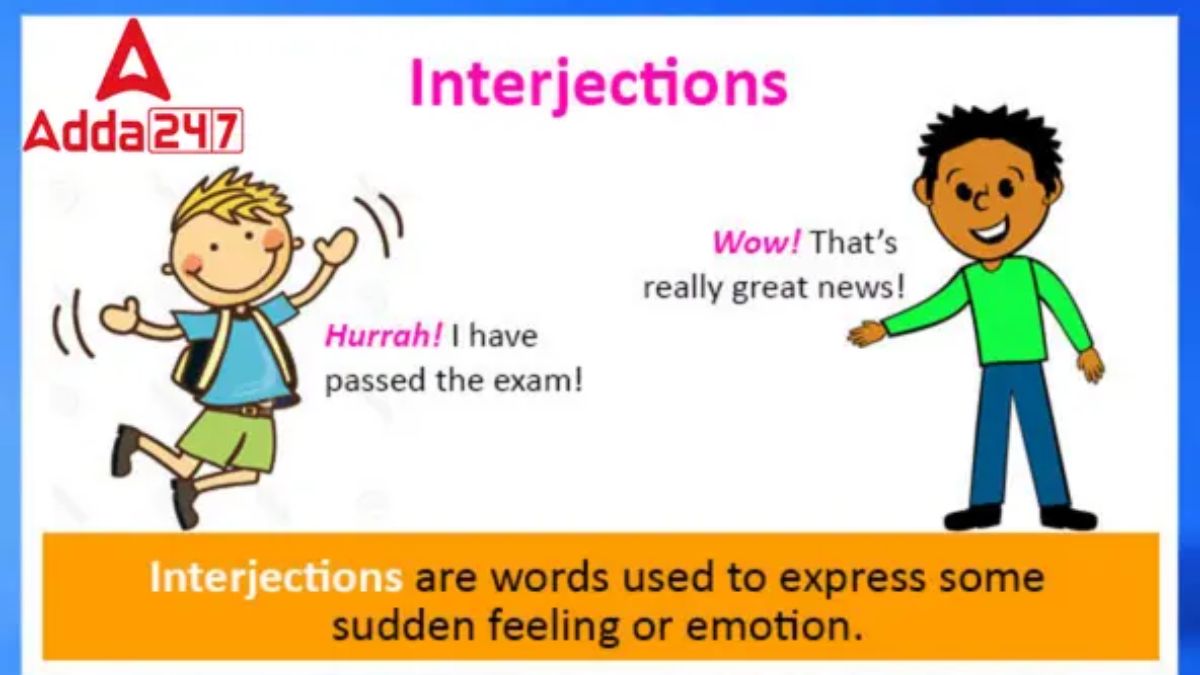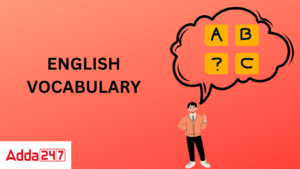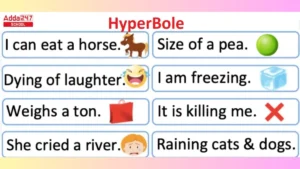Interjections Meaning
Interjection is a grammatical device that is used to communicate or convey sudden feelings and emotions. Interjections can be used at any point in a sentence; however, they are most frequently found at the start of sentences. To create exclamatory sentences, they are used. Examine the definitions of interjections in several dictionaries to have a better understanding of what they exactly are.
Interjection Definition
Check the definition of interjections as per the famous English Grammar dictionaries below.
An interjection is described as “a short sound, word, or phrase delivered suddenly to indicate an emotion” in the Oxford Learner’s Dictionary.
An interjection is a word that “is used to show a short sudden expression of emotion,” according to the Cambridge Dictionary.
An interjection is described as “a word or phrase used in the exclamation” by Merriam-Dictionary, Webster’s while by the Macmillan Dictionary, it is “a word or phrase used for expressing a strong emotion such as surprise or anger.”
An interjection is “a word or statement used to communicate a strong feeling such as surprise, pain, or horror,” according to the Collins Dictionary.
Interjections Examples
Examples of interjections are given below:
- Hurray! India won the match.
- Ouch! It really hurts me.
- Wow! That is a beautiful scene indeed.
- Oh my God! That was awesome.
- Whoa! That bridge is unbelievably huge.
How to Use Interjections
There are a few important rules that you should keep in mind when using interjections. The details you need to keep in mind are listed below.
- A comma should come after a short interjection used at the beginning of a sentence.
- When an interjection is used alone as a sentence, a full stop, a question mark, or an exclamation point can come after it.
- A comma must come before and after an interjection when it is used in the middle of a sentence.
- Interjections in a conversation can occasionally stand on their own.
- In a formal situation, it is preferable to avoid using any interjections at all.
Interjections Examples Sentences- Video Explanation
A video explanation of interjection is given here.
List of Interjection Example Sentences
Candidates can check the sentence examples of interjections below.
| Examples of Interjections | ||
| Interjection | Purpose | Example |
| Ah! | To express realization or surprise | Ah, that party was a total surprise! |
| Alas! | To express sadness or pity | Alas! That was so unexpected. |
| Dear! | To express pity or surprise | Oh dear! I feel really bad for your father. |
| Eh! | To enquire or ask for something to be repeated | Eh! I didn’t understand. Can you please repeat it? |
| Hey! | To express surprise or call for attention | Hey! Look out for that building. |
| Hurray! | To express joy | Hurray! We finally cleared the exam. |
| Oh! | To express pain or surprise | Oh! I have a really bad headache. |
| Ouch! | To express pain | Ouch! You stepped on my toes. |
| Phew! | To express relief, exhaustion, disgust | Phew! That was an extremely boring lecture. |
| Uh! | To express hesitation | Uh! I don’t think I want to be a part of this. |
| Well, | To introduce a remark | Well, you sing really well. |
| Wow! | To express your admiration for something | Wow! Your new sports car is amazing. |
| Yippee! | To express joy | Yippee! Tomorrow we are going on a picnic. |
Types of Interjections
The Interjections are usually categorized on the basis of emotions they convey. The types are mentioned below.
- The Interjection of greeting.
- The Interjection of joy.
- The Interjection of attention.
- The Interjection of approval.
- The Interjection of surprise.
- The Interjection of sorrow.
Exercise on Interjections Sentences
Fill in the blanks with the most suitable interjection in the following sentences.
(Ouch, yippee, bravo, alas, my God, well, uh, ah, wow, oh no)
- ______, that is new!
- ______ That hurt me more than I thought it would.
- ______ We got the tickets to the movie premier night.
- ______ I don’t want to do it this way.
- ______ You did a really great job with that piece of furniture.
- ______ now I understand what you were trying to say.
- ______ That should have really upset you.
- ______ I have not cleared the internal assessment.
- ______ That was a really brave thing to do.
- _______ The waiting list for the reserved seats is too long; I don’t think we would get a seat.
Check out if you have filled in the blanks with the correct interjections from the answers given below.
- Well, that is new!
- Ouch! That hurt me more than I thought it would.
- Yippee! We got the tickets to the movie premier night.
- Uh, I don’t want to do it this way.
- Wow! You did a really great job with that piece of furniture.
- Ah, now I understand what you were trying to say.
- Oh no! That should have really upset you.
- Alas! I have not cleared the internal assessment.
- Bravo! That was a really brave thing to do.
- My God! The waiting list for the reserved seats is too long; I don’t think we would get a seat.
| Related Articles | |
| Nouns | Pronouns |
| Adjectives | Adverbs |
| Conjunctions | Prepositions |











 Vocabulary Words with Meaning and Senten...
Vocabulary Words with Meaning and Senten...
 Past Perfect Tense: Definition, Formula,...
Past Perfect Tense: Definition, Formula,...
 Hyperbole- Explanation, Definition, Exam...
Hyperbole- Explanation, Definition, Exam...














